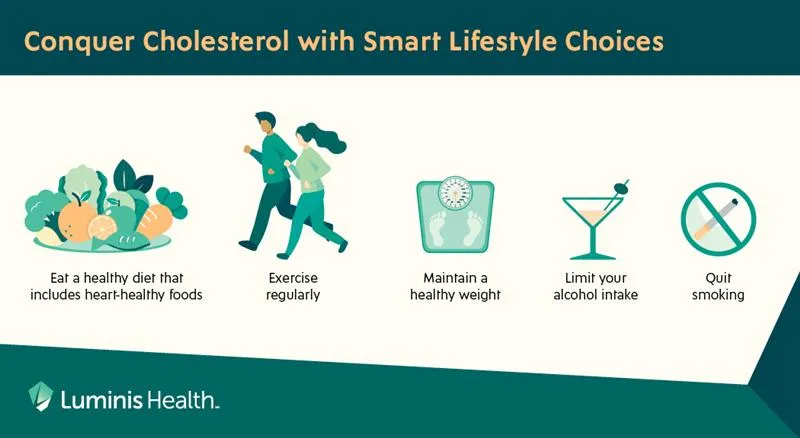Do you have high cholesterol? You’re not alone — millions of adults in the United States face this common but serious issue. High cholesterol increases the risk of heart disease, stroke and other chronic health conditions. In Prince George’s County, heart disease is the leading cause of death, underscoring the urgency of managing cholesterol levels. But how can you take control? At Luminis Health, we understand it’s not always easy. That’s why we’re here to explore the difference between “good,” “bad” and even “stealthy” cholesterol, review lifestyle changes that can help, and weigh the pros and cons of statin medications.
Good vs. bad cholesterol
Believe it or not, cholesterol isn’t all bad. Cholesterol helps build cells, create hormones and vitamin D, and aid in digestion. Problems can develop, however, when you have too much bad cholesterol or not enough good cholesterol in your bloodstream.
In your body, cholesterol and triglycerides (fats from food, such as butter) combine with proteins to form lipoproteins, which travel to cells through your bloodstream. It’s likely you’ve heard of these, although perhaps by nickname:
- High-density lipoprotein (HDL) is often referred to as “good cholesterol” because its job is to move the bad cholesterol out of your arteries and into your liver, where it breaks down. Good cholesterol can be found in foods like nuts, fruits and vegetables, avocados, olive oil, oatmeal, beans and whole grains.
- Low-density lipoprotein (LDL), also known as “bad cholesterol,” causes fat to build up in your arteries, either restricting or blocking blood flow. Bad cholesterol is common in foods like red meats, processed meats and fried foods.
- Stealthy cholesterol is the common name for lipoprotein(a) or Lp(a). It’s often called “stealthy cholesterol” because high Lp(a) levels usually don’t cause symptoms and diet, exercise and cholesterol medication don’t affect it. It’s a genetic condition detected by a special blood test.
You can have high cholesterol if you have too much LDL, too little HDL or a combination of both. Stealthy cholesterol is also quite common. According to the American Heart Association, one in five people worldwide has high levels of Lp(a).
Whether you have high or stealthy cholesterol, you’re at an increased risk of experiencing heart pain (angina), a heart attack or a stroke.
How to combat high cholesterol
Certain lifestyle changes can help you keep your cholesterol in check, including:
- Eating a healthy diet that includes heart-healthy foods like vegetables, fruits, whole grains, fat-free or low-fat dairy, and protein-rich foods such as fish and lean meats.
- Exercising regularly — aim for 150 minutes each week.
- Limiting your alcohol intake.
- Maintaining a healthy weight.
- Quitting smoking.
If high cholesterol is an issue for you, your doctor may also prescribe medications to decrease your levels of bad cholesterol, increase your levels of good cholesterol and/or reduce your levels of triglycerides. One type of medication, called statins, can do all three.
The pros and cons of statins
Unfortunately, you can still have high cholesterol, even if you maintain a healthier lifestyle or have recently made some positive changes. Many of us now take a statin, which is a class of medication that helps lower cholesterol. Statins work by blocking a substance your body uses to produce cholesterol, helping to slow the buildup of plaque in the arteries.
Statins are especially beneficial for people who have already had a heart attack or are at high risk due to conditions like diabetes or high blood pressure. In addition to lowering cholesterol, statins may also have anti-inflammatory effects that further protect the heart and blood vessels.
However, it’s important to be aware that statins can come with potential side effects, such as:
- Constipation
- Diarrhea
- Fatigue or sleep issues
- Headache
- Increased blood sugar
- Liver damage
- Muscle or stomach pain
- Nausea or vomiting
- Rash
You’re more likely to experience side effects from statins if you’re female, take other cholesterol-lowering medications, drink excessive alcohol or have conditions like hypothyroidism, kidney disease or liver disease.
Certain medications and even foods (such as grapefruit juice) can also interact with statins. Your doctor can help you weigh the risks and benefits to decide if statins are right for you.
The support you need, close to home
If you suspect you have high cholesterol or are experiencing concerning symptoms, it’s important to seek expert medical screening and treatment. The faster you get a diagnosis, the sooner we can take steps to help you lower your risk for serious health complications. Find a primary care provider at Luminis.Health/PrimaryCare or call 301-927-0088 to schedule an appointment at our Greenbelt location.
The Luminis Health Community Health team also offers free community clinics with essential screenings, including A1C testing, cholesterol and blood pressure screenings. For details about upcoming clinics, visit Luminis.Health/CommunityClinics.
Authors
 Sufia Syed, MD is an internal medicine physician at Luminis Health.
Sufia Syed, MD is an internal medicine physician at Luminis Health.





